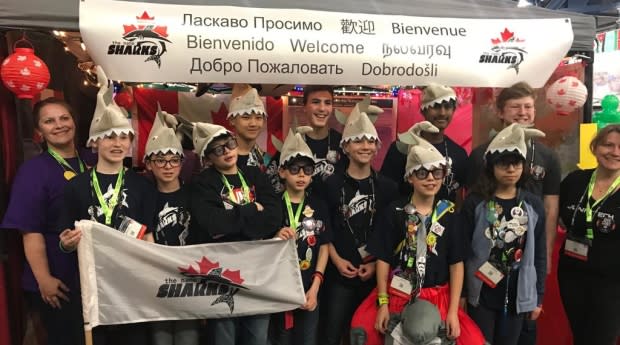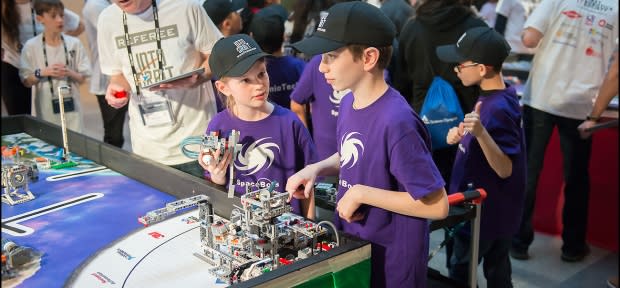These Calgary school kids think they've found a way to grow food on Mars
A group of budding outer space social innovators from Calgary think they've found the secret to growing food on Mars.
The Nanosharks, a science team from JunioTech Kids Academy in Calgary are in Texas this weekend, competing in the FIRST (For Inspiration and Recognition of Science and Technology) Lego League Championship.
That's the name of an annual science competition, where teams of young people from around the world research real-world problems in areas such as energy or food-safety, then pitch a solution by navigating a Lego robot through a course.
The Nanosharks were one of two Canadian teams selected to compete in Houston, with a pitch to grow food on Mars by turning the nutrient-deficient soil of the Red Planet into growing fields that one day might sprout field peas.
That's what 12-year-old David Krutik told Calgary Eyeopener host David Gray in a Friday interview.
"We're planning to kind of make this type of fertilizer where we're going to place it in the [Martian] soil, and when it mixes with the soil it's going to be like Earth soil," Krutik said.
So where will all that fertilizer come from? Gray asked Krutik.
"Humans," said Krutik.

Growing food on Mars
That was expanded upon by Alex Gubski, the Nanoshark's robotics coach and mentor.
"They are obviously carrying the water for hydroponics projects," Gubski said.
"That was a little bit bulky and more on the expensive side, so the kids decided, 'OK, how we can augment the idea of growing food for Martian colonies versus hydroponics?'
"So they thought, 'we'll just analyze different cultures and see which ones will improve their quality of soil better."
That's when they came up with the idea of turning poop into fertilizer.
"That will be in abundance," Gubski said. "Travel to Mars will be a few months, so they're going to bring a few hundred pounds of that."
That pitch will be part of the Nanoshark's presentation in Houston, which Gubski said is a three-pronged competition.
"It's the core values — how they operate as a team," he said.
"It's the project, which is the scientific part of the competition," he added.
"And the third one is a robotic game. So teams get to build a robot, program it, and try to score as many points as possible in 2.5 minutes.
"All teams are judged in all three areas. In general, a score depends on their good performance in all three, and they're scored and awarded, based on that."

Whether the Nanosharks ever get the opportunity to test out their ideas on the Red Planet remains to be seen,. But what's not debatable is that an event such as this helps engage young people in STEM (science, technology, engineering and mathematics), at the same time encouraging the core values of FIRST, such as teamwork and innovative approaches to real-world problem solving.
Don't tell Krutik — who is back for the second time — or any of the rest of the Nanosharks all that stuff, however.
They have their own reasons for promoting Martian agriculture.
"It was fun," Krutik said. "Every day we had like two hours on the weekends to work on it. It didn't take too much time out of my day. Sometimes, we'd go to each other's houses to work on it — and then we'd also play."
With files from the Calgary Eyeopener.

